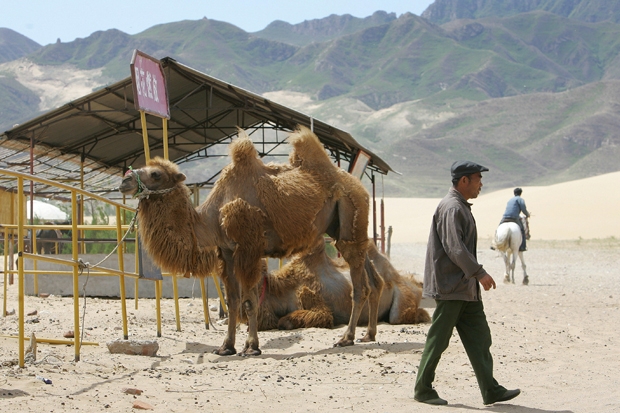Jumping the shark isn’t yet an Olympic sport, but if it were the International Olympic Committee would be a shoo-in for gold. And silver and bronze too. Amid some low-key hoopla last week, the IOC awarded the 2022 Winter Games to Beijing. Yes, that’s the same Beijing that staged the 2008 Olympics and in a couple of weeks will put on the World Athletics Championships.
The 2022 bidding boiled down to a two-horse race between Almaty, Kazakhstan, which at least has some snow; and Beijing, which doesn’t. The previous front-runner, Oslo, withdrew its bid last autumn after all the main political parties rejected the funding plans for the Games. It also later transpired that the IOC had demanded ludicrous privileges, including cocktail parties with the king and tax exemptions for its people. Earlier in the race, Stockholm and Krakow dropped their bids for financial or political reasons. It’s a sorry state of affairs: the Games are supposed to be the ‘greatest sporting event on the planet’, but are fast becoming a shindig for countries with a political point to prove and for whom money is no object.
Winning the Olympics is supposed to spark national euphoria. When London was awarded its Games — just over a decade ago — Trafalgar Square went berserk with elation. But given the history of the 2022 Games, known as the ‘Games nobody wants’, will those scenes ever be repeated?
Beijing is costed at £3 billion, but nobody gets to look at the books. Last year’s Winter Games in Sochi were the most expensive ever, as costs spiralled from £7 billion to £34 billion, with dizzying amounts siphoned off. But that didn’t matter: Sochi was Putin’s pet project, and gave him a chance to flex his muscles, literally and metaphorically, in front of a global audience.
At least China isn’t making grandiose claims for its burgeoning ski industry, partly because there isn’t much of one. And there’s very little snow either, especially near Beijing. As the New York Times observed, it was a pity that the IOC couldn’t clear one of the first and lowest hurdles for any city wanting to stage a Winter Games, namely snow. Snow sports are in their infancy in China. Few people can ski, and most have never set eyes on a pair of skis. Still there’s always the legacy argument. Legacy? Just a piece of marketing guff: even after the dazzling success of London 2012, active sports participation in the UK is tanking.
Almost all the sliding events at Beijing will have to be on man-made snow. The alpine events at Beijing are taking place more than 100 miles from the city, on the edge of the Gobi desert no less, at a place called Zhangjiakou, which gets just a few inches of snow each year. Never mind: all the surrounding fishing lakes can be drained, whatever the environmental costs in these climate-conscious times. China is not a place to let Mother Nature call the shots: they will just give her a good kicking and tell her who’s boss.
And then there’s the little matter of, er, human rights, torture and all that democracy stuff. It is a privilege to stage these major sporting events, and they bring huge global promotion. Is it too much to ask that cities and countries who want to put them on vaguely subscribe to general principles of human rights, multi-party democracy, freedom of speech, gender and sexual equality, tolerance and so on? Or at least pretend to?
It’s the carrot-and-stick argument: you have the games, but start behaving. But then, oh gosh, that is a lot of cash you’re talking about, old boy. Tell you what, have the carrot anyway, but you do promise to improve things don’t you, and stop torturing people and all that. You do? Oh good, that’s fine then. And you have made that booking at the Four Seasons, Beijing, haven’t you? There will be something nice for the wives as well? Great, that’s all good then.







Comments